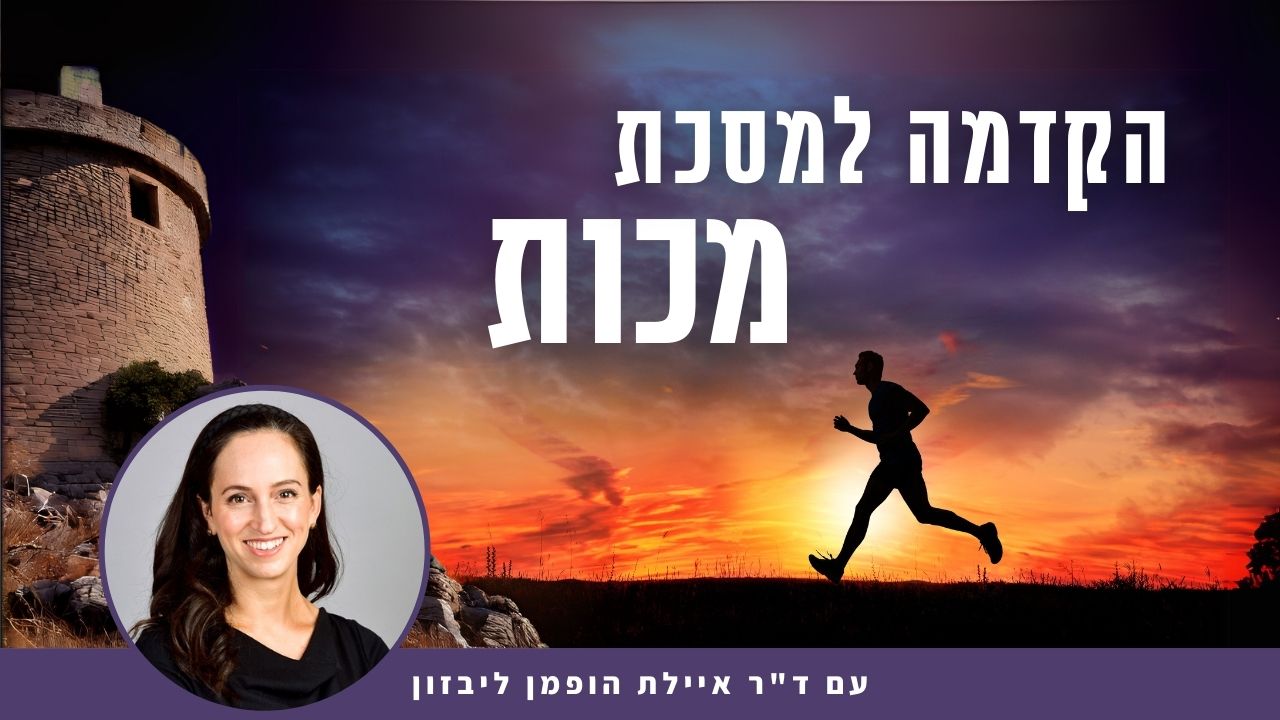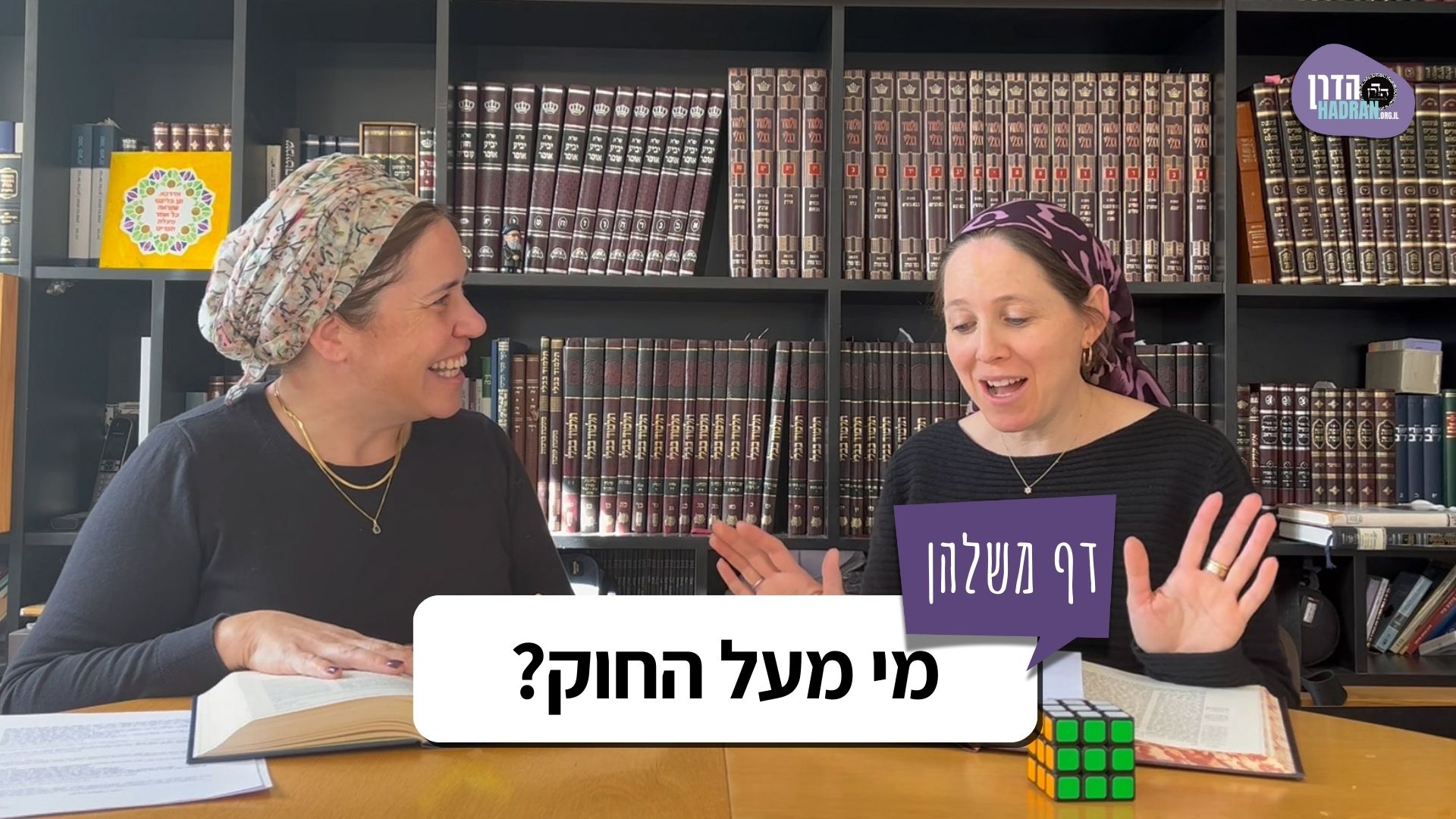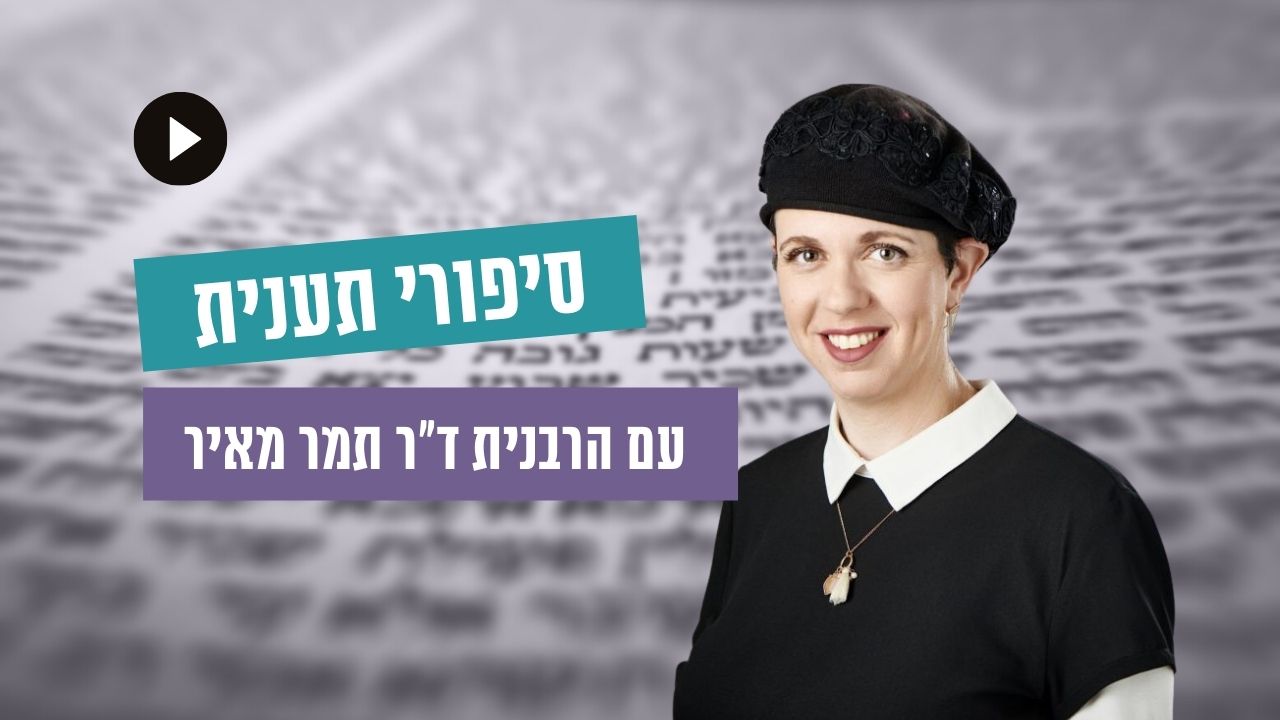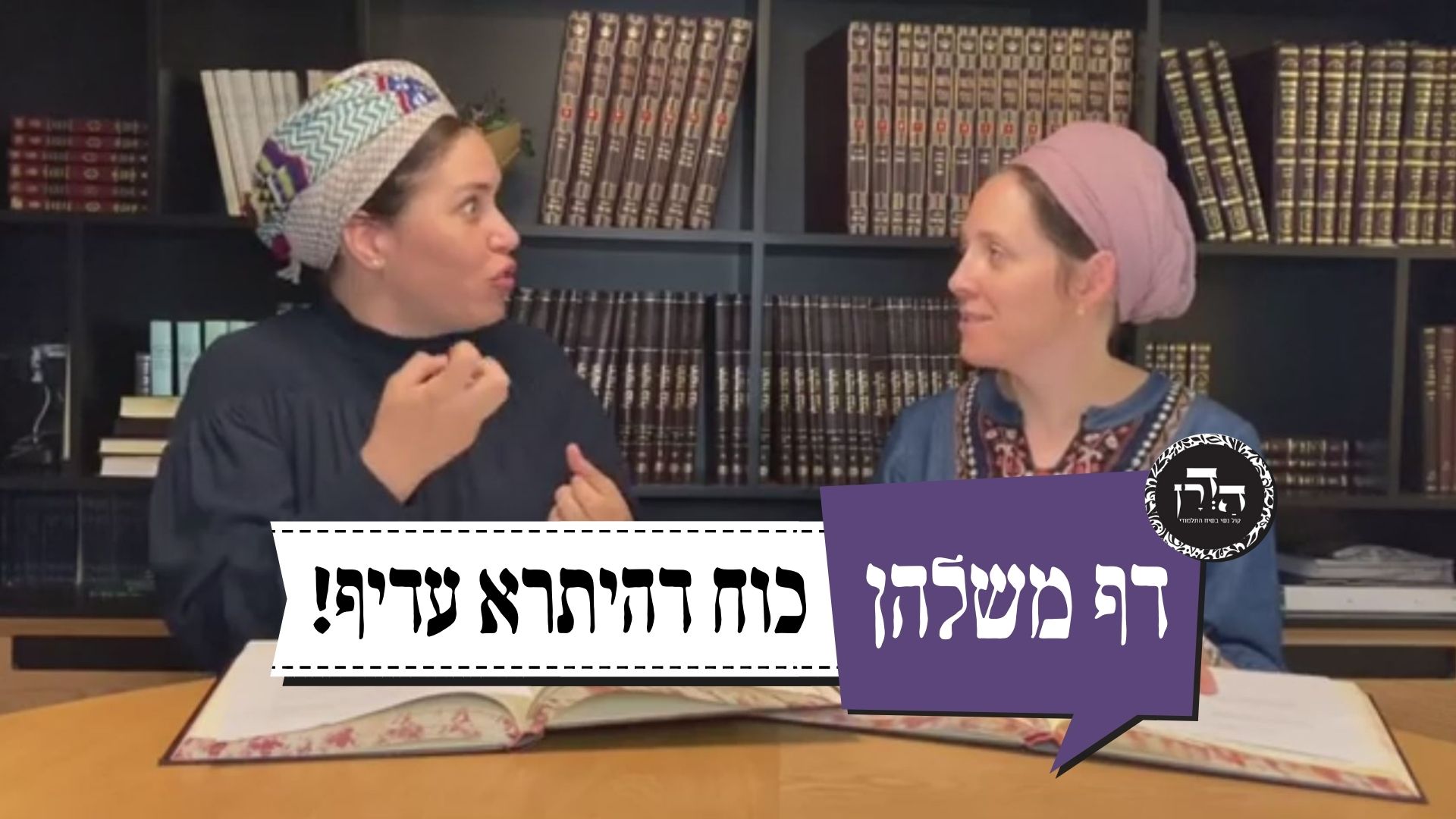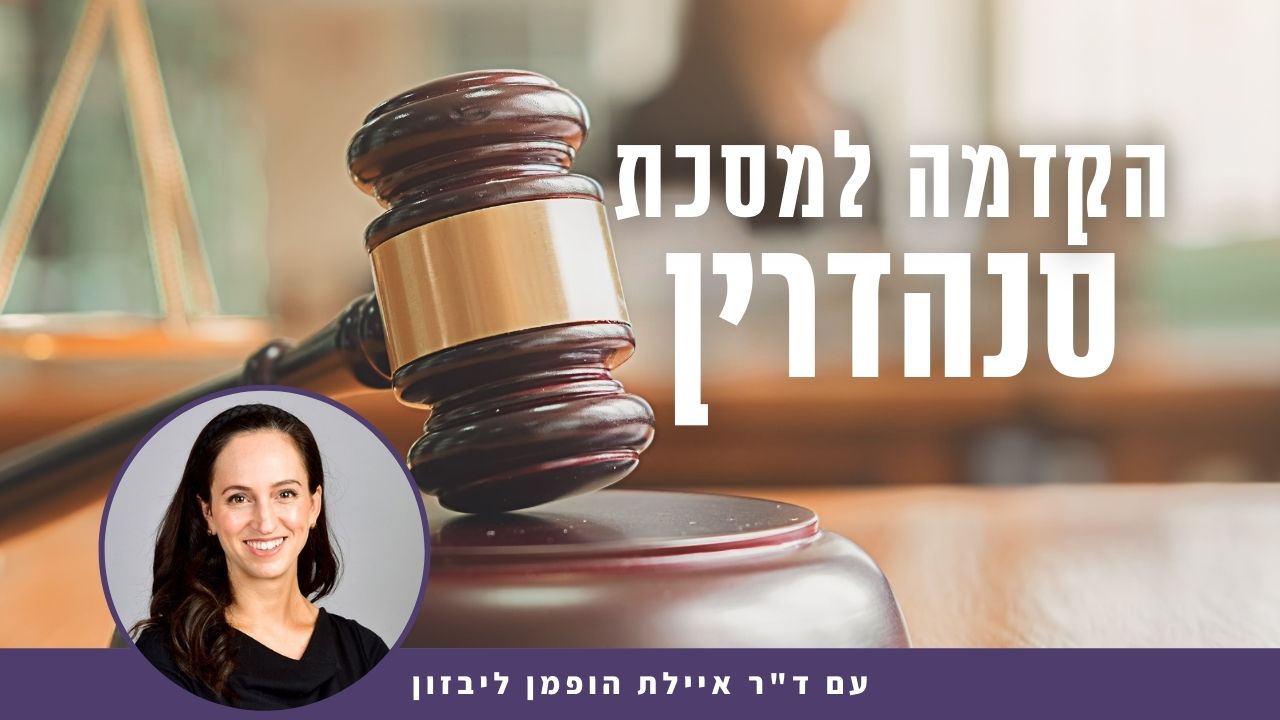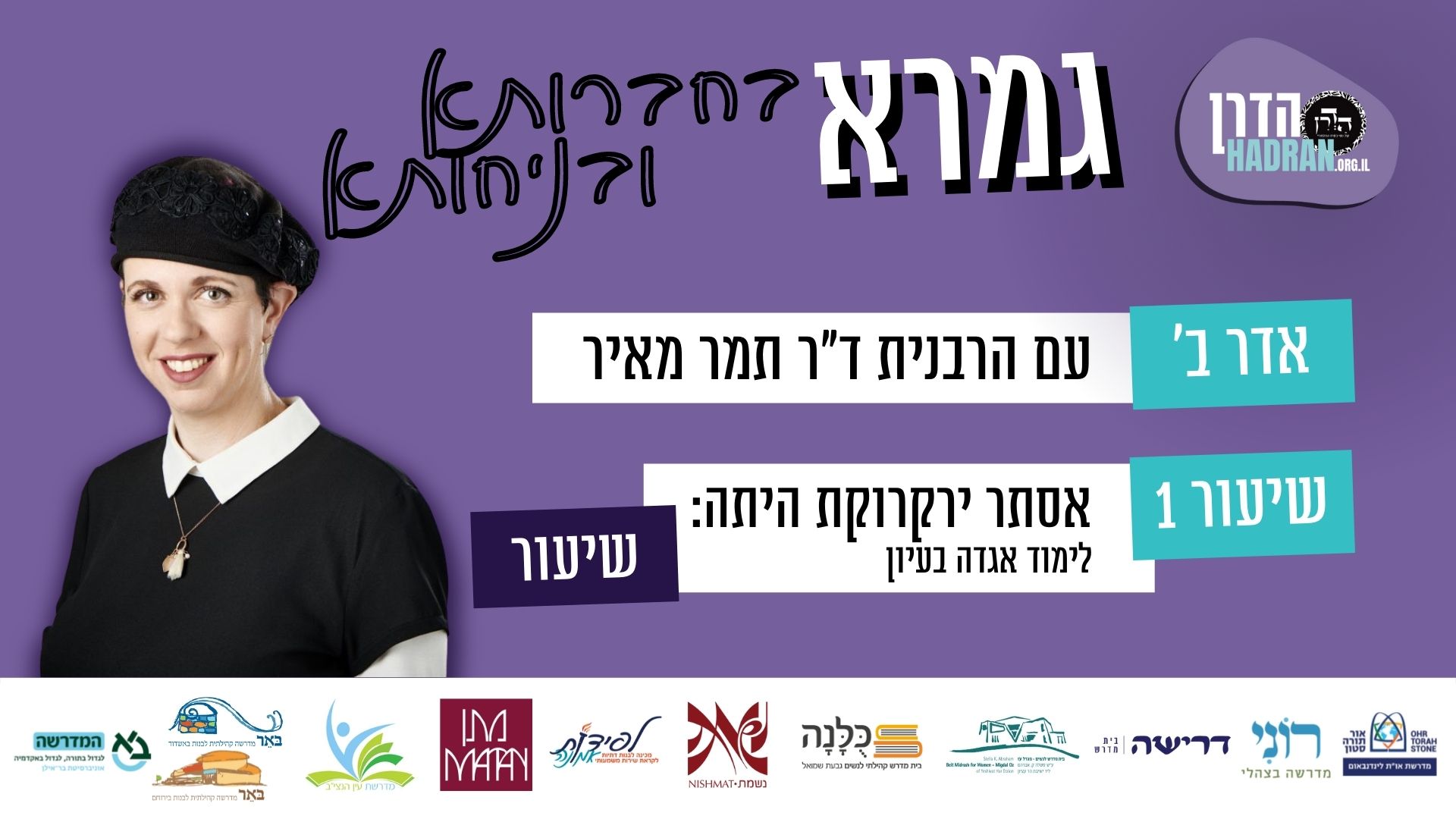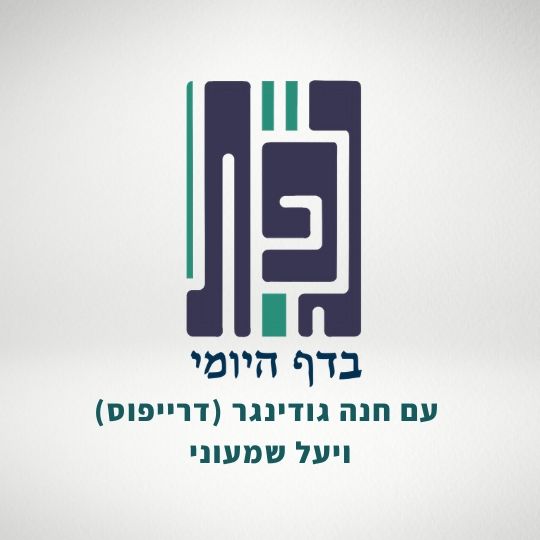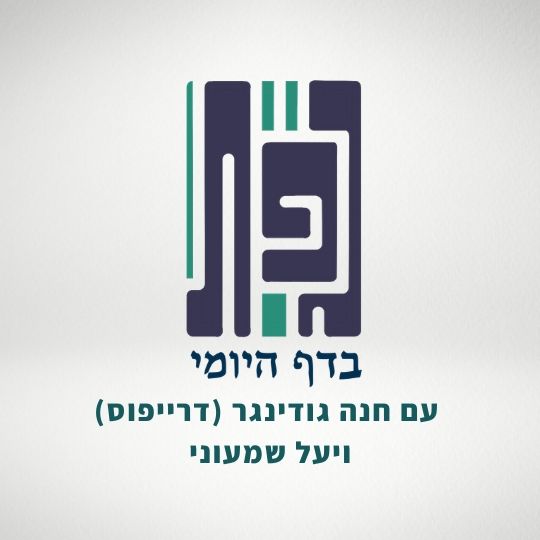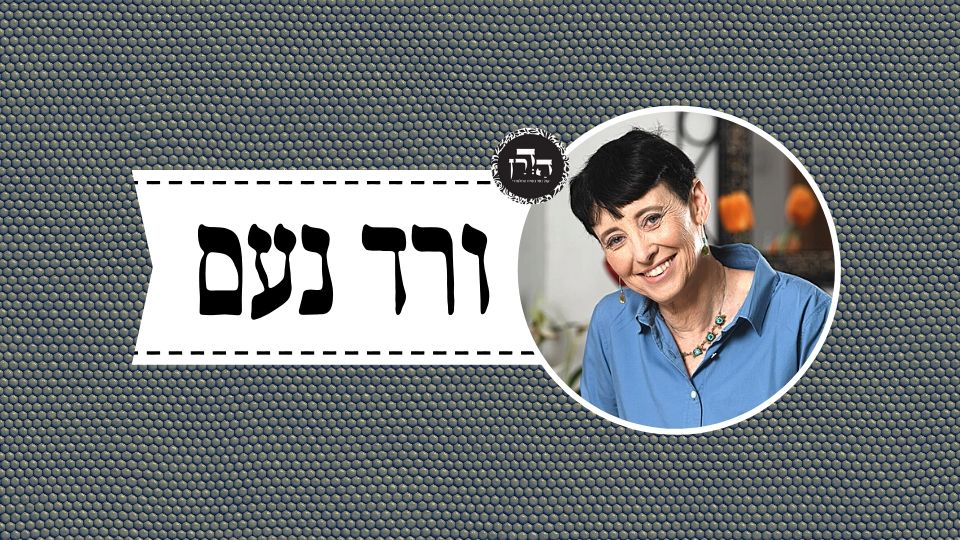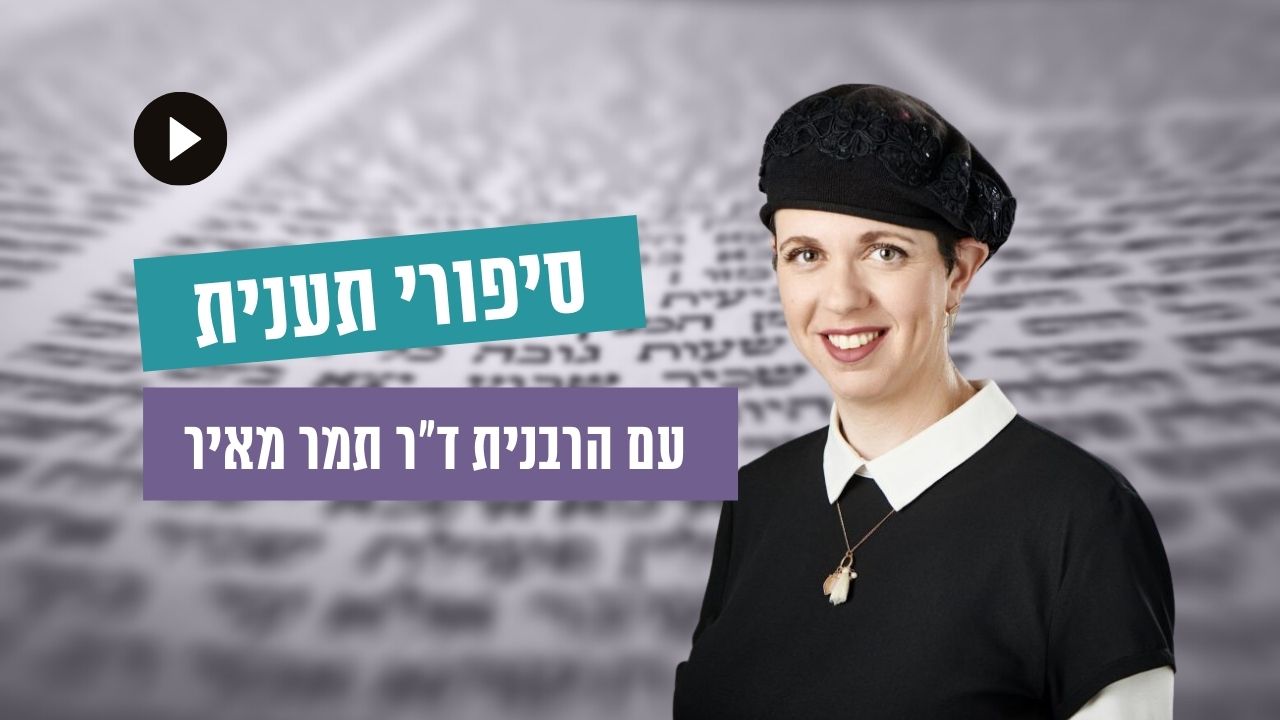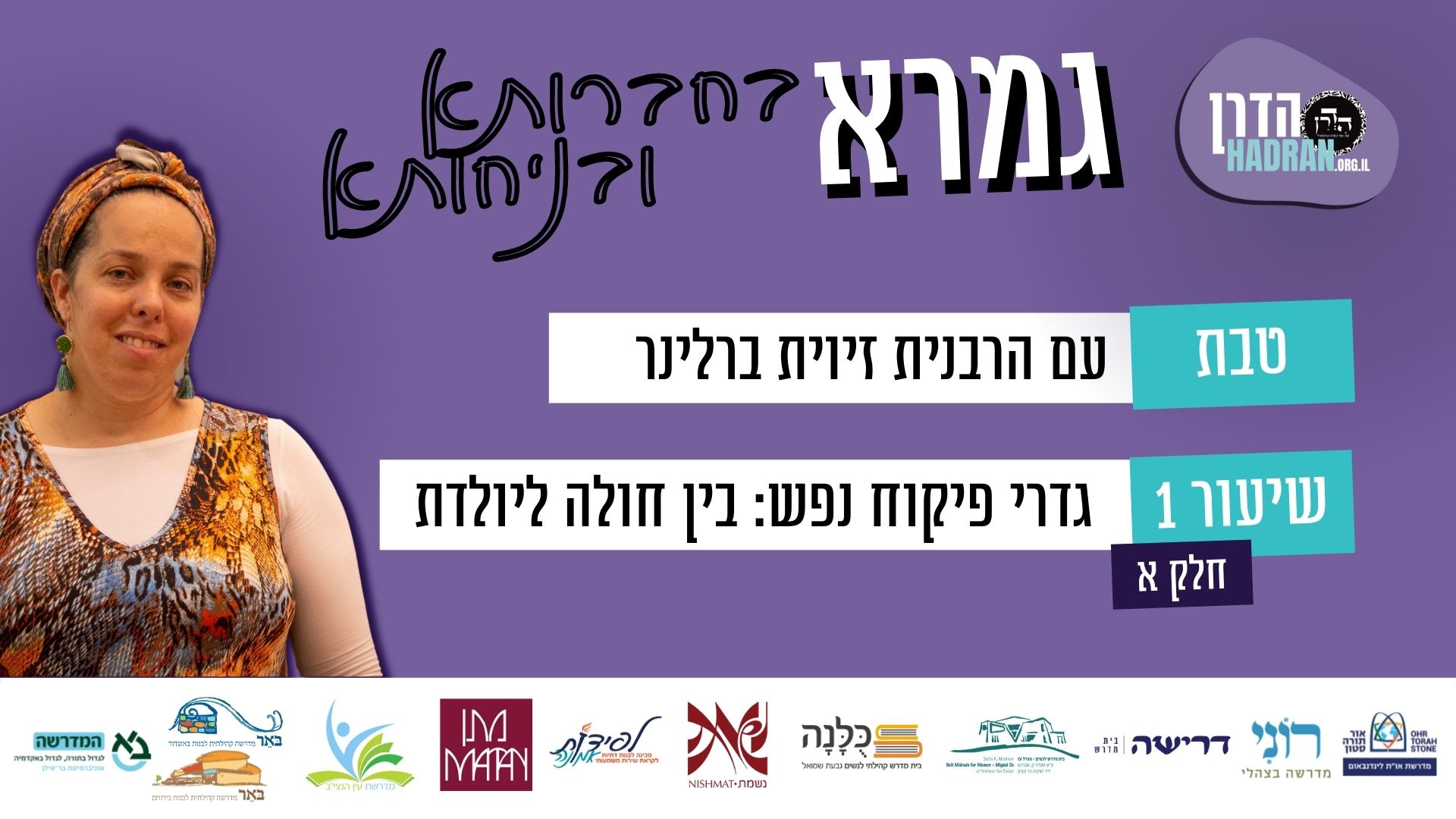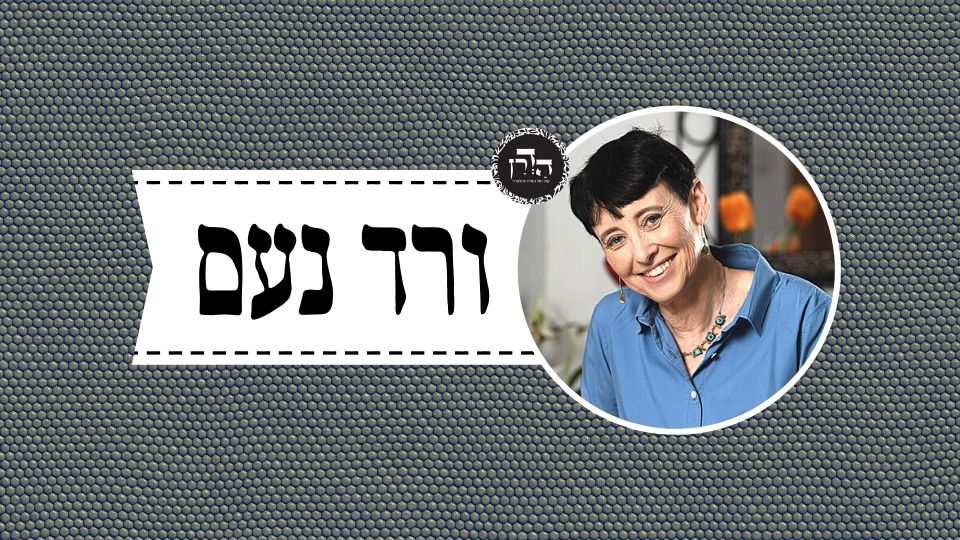עוד שתי ניסיונות להבין לאיזה דברי רבי יהודה מיוחסים דברי רב. למסקנה זה תואם שיטת ר’ יהודה בדיני במבשל בשבת בשוגג. באיזה סוגי סכינים וכדומה מותר/אסור לשחוט? לדעת מי נשנית המשנה?
הלימוד השבוע מוקדש לזכות ולשלום הַיְימׇנוֹט אֱמוּנָה בַּת באנצ’י (קָסָאוּ) בת 11 שנעלמה במקום מגוריה בצפת, לפני שנתיים, ביום ט”ז אדר תשפ”ד (25.2.24), ולא נודעו עקבותיה.
הלימוד השבוע מוקדש למען ביטחון המדינה, החיילים והאזרחים, ולמען חירותו של העם האיראני. שנזכה בקרוב שיתקיים בנו הפסוק: "לַיְּהוּדִים הָיְתָה אוֹרָה וְשִׂמְחָה וְשָׂשֹׂן וִיקָר”.
הלימוד השבוע מוקדש לזכות וְלִשְׁלוֹם הָיימָנוֹט אֱמוּנָה בַּת באנצ’י (קָסָאוּ), בת 11 שנעלמה במקום מגוריה בצפת, לפני שנתיים, ביום ט”ז אדר תשפ״ד (25.2.24), ולא נודעו עקבותיה. אנו מתפללים שֶׁתִּמָּצֵא וְתוּשַׁב לביתה במהרה!
רוצה להקדיש שיעור?

כלים
הלימוד השבוע מוקדש לזכות ולשלום הַיְימׇנוֹט אֱמוּנָה בַּת באנצ’י (קָסָאוּ) בת 11 שנעלמה במקום מגוריה בצפת, לפני שנתיים, ביום ט”ז אדר תשפ”ד (25.2.24), ולא נודעו עקבותיה.
הלימוד השבוע מוקדש למען ביטחון המדינה, החיילים והאזרחים, ולמען חירותו של העם האיראני. שנזכה בקרוב שיתקיים בנו הפסוק: "לַיְּהוּדִים הָיְתָה אוֹרָה וְשִׂמְחָה וְשָׂשֹׂן וִיקָר”.
הלימוד השבוע מוקדש לזכות וְלִשְׁלוֹם הָיימָנוֹט אֱמוּנָה בַּת באנצ’י (קָסָאוּ), בת 11 שנעלמה במקום מגוריה בצפת, לפני שנתיים, ביום ט”ז אדר תשפ״ד (25.2.24), ולא נודעו עקבותיה. אנו מתפללים שֶׁתִּמָּצֵא וְתוּשַׁב לביתה במהרה!
כלים
העמקה
רוצה להבין מה באמת קורה מתחת לפני השטח של הסוגיה?
שיעורים, פודקאסטים והרחבות של מיטב המורות שלנו יפתחו לך עוד זוויות וכיווני חשיבה.
חדשה בלימוד הגמרא?
זה הדף הראשון שלך? איזו התרגשות עצומה! יש לנו בדיוק את התכנים והכלים שיעזרו לך לעשות את הצעדים הראשונים ללמידה בקצב וברמה שלך, כך תוכלי להרגיש בנוח גם בתוך הסוגיות המורכבות ומאתגרות.
פסיפס הלומדות שלנו
גלי את קהילת הלומדות שלנו, מגוון נשים, רקעים וסיפורים. כולן חלק מתנועה ומסע מרגש ועוצמתי.
חולין טו
כל נרות של מתכת מטלטלין חוץ מן הנר שהדליקו בו באותה שבת
One may move all metal lamps on Shabbat, even old ones, because they do not become repugnant like earthenware lamps, except for a metal lamp that one kindled on that same Shabbat and that was burning when Shabbat began, which it is prohibited to move for the entire Shabbat due to the prohibition against extinguishing.
ודלמא שאני התם דהוא דחי ליה בידים
The Gemara rejects that analogy. And perhaps it is different there, in the case of the burning lamp, as he set it aside by direct action when he kindled the lamp. By contrast, in the case of an animal, he did not set it aside, and therefore, perhaps once it is slaughtered it is permitted.
אלא אמר רב אשי רבי יהודה דמבשל היא דתנן המבשל בשבת בשוגג יאכל במזיד לא יאכל דברי רבי מאיר
Rather, Rav Ashi said: When Rav said that the halakha that consumption of the animal is prohibited for that day is the opinion of Rabbi Yehuda, the reference is to the opinion of Rabbi Yehuda with regard to one who cooks, as we learned in a baraita: With regard to one who cooks on Shabbat, if he did so unwittingly, he may eat what he cooked. If he acted intentionally, he may not eat what he cooked. This is the statement of Rabbi Meir.
רבי יהודה אומר בשוגג יאכל במוצאי שבת במזיד לא יאכל עולמית
Rabbi Yehuda says: If he cooked the food unwittingly, he may eat it at the conclusion of Shabbat, as the Sages penalized even one who sinned unwittingly by prohibiting him from deriving immediate benefit from the dish that he cooked. If he cooked it intentionally, he may never eat from it.
רבי יוחנן הסנדלר אומר בשוגג יאכל למוצאי שבת לאחרים ולא לו במזיד לא יאכל עולמית לא לו ולא לאחרים
Rabbi Yoḥanan HaSandlar says: If he acted unwittingly, the food may be eaten at the conclusion of Shabbat by others, but not by him. If he cooked the food intentionally, it may never be eaten, neither by him nor by others. According to Rav, the mishna is referring to a case where one slaughtered the animal unwittingly. According to Rabbi Yehuda, the slaughter is valid but it is prohibited to eat the animal on Shabbat.
ונוקמה במזיד ורבי מאיר
The Gemara challenges this: And let us interpret the mishna as referring to a case where he slaughtered the animal intentionally, and explain that it is in accordance with the opinion of Rabbi Meir, who rules that eating the animal in such a case is permitted only after the conclusion of Shabbat.
לא סלקא דעתך דקתני דומיא דיום הכפורים מה יום הכפורים לא שנא בשוגג ולא שנא במזיד לא אכיל אף הכא נמי לא שנא בשוגג ולא שנא במזיד לא אכיל
The Gemara responds: That possibility should not enter your mind, as the case of slaughter on Shabbat is juxtaposed to and taught in a manner similar to the case of slaughter on Yom Kippur. Just as with regard to slaughter on Yom Kippur, it is no different whether one slaughtered it unwittingly and it is no different whether he slaughtered it intentionally, he may not eat it that day due to the fast, so too here, with regard to slaughter on Shabbat, it is no different whether he slaughtered it unwittingly and it is no different whether he slaughtered it intentionally, he may not eat it that day. Rabbi Meir, though, deems it permitted for one who cooked unwittingly to eat the cooked food on Shabbat.
ומי מצית מוקמת לה בשוגג ורבי יהודה והא אף על פי שמתחייב בנפשו קתני הכי קאמר אע”פ דבמזיד מתחייב בנפשו הוא הכא דבשוגג שחיטתו כשרה
The Gemara asks: And can you interpret the mishna as referring to a case of unwitting slaughter and in accordance with the opinion of Rabbi Yehuda? But isn’t it taught in the mishna: Although he is liable to receive the death penalty? One is liable to be executed only if he intentionally performs labor on Shabbat. The Gemara answers that this is what the mishna is saying: Although if he slaughtered it intentionally he is liable to receive the death penalty, here, in a case where he slaughtered the animal unwittingly, his slaughter is valid.
ונוקמה כרבי יוחנן הסנדלר דאמר לא שנא בשוגג ולא שנא במזיד לא אכיל רבי יוחנן הסנדלר קמפליג במוצאי שבת לאחרים ולא לו תנא דידן שחיטתו כשרה קתני לא שנא לו ולא שנא לאחרים
The Gemara challenges: And let us interpret the mishna in accordance with the opinion of Rabbi Yoḥanan HaSandlar, who says: It is no different whether he cooked unwittingly and it is no different whether he cooked intentionally; he may not eat it on Shabbat. The Gemara explains: Rabbi Yoḥanan HaSandlar draws a distinction with regard to the conclusion of Shabbat, in that he permits eating food cooked on Shabbat for others and not for him, while the tanna of our mishna teaches: His slaughter is valid, without qualification, indicating that with regard to his ruling it is no different for him and it is no different for others.
תני תנא קמיה דרב המבשל בשבת בשוגג יאכל במזיד לא יאכל ומשתיק ליה רב
§ The tanna taught a baraita before Rav: One who cooks on Shabbat unwittingly may eat the food that he cooked; if he did so intentionally, he may not eat the food that he cooked, and Rav silenced him.
מאי טעמא משתיק ליה אילימא משום דסבירא ליה כרבי יהודה ותנא תני כרבי מאיר משום דסבירא ליה כרבי יהודה מאן דתני כרבי מאיר משתיק ליה
The Gemara asks: What is the reason that Rav silenced him? If we say it is because Rav holds in accordance with the opinion of Rabbi Yehuda and the tanna taught the baraita in accordance with the opinion of Rabbi Meir, can it be that merely because he holds in accordance with the opinion of Rabbi Yehuda he silences one who teaches a baraita in accordance with the opinion of Rabbi Meir?
ועוד מי סבר לה כרבי יהודה והאמר רב חנן בר אמי כי מורי להו רב לתלמידיה מורי להו כר’ מאיר וכי דריש בפירקא דריש כרבי יהודה משום עמי הארץ
And furthermore, does Rav hold in accordance with the opinion of Rabbi Yehuda? But doesn’t Rav Ḥanan bar Ami say: When Rav issues a ruling to his students, he issues a ruling in accordance with the opinion of Rabbi Meir, and when he teaches in his public lecture delivered on the Festival, he teaches in accordance with the opinion of Rabbi Yehuda, due to his concern that the ignoramuses would treat the prohibition of labor on Shabbat with disdain?
וכי תימא תנא בפירקיה תנא קמיה אטו כולי עלמא לתנא צייתי לאמורא צייתי
And if you would say that the tanna taught the baraita before Rav during the public lecture and Rav silenced him so that the ignoramuses would not learn from him, is that to say that everyone attending the public lecture listens to the tanna who is citing the baraita? There is no need to silence the tanna, because they listen to the disseminator [amora], the Sage who repeats what he hears from Rav loudly for the benefit of those attending the lecture, and the amora quoted Rav’s ruling in accordance with the opinion of Rabbi Yehuda.
אמר רב נחמן בר יצחק תנא שוחט תנא קמיה דרב השוחט בשבת בשוגג יאכל במזיד לא יאכל אמר ליה מאי דעתיך כרבי מאיר עד כאן לא קשרי רבי מאיר אלא במבשל דראוי לכוס אבל שוחט דאין ראוי לכוס לא
Rav Naḥman bar Yitzḥak said: The tanna taught the halakha of one who slaughters before Rav: One who slaughters an animal on Shabbat unwittingly may eat from the slaughtered animal; if he slaughtered it intentionally, he may not eat from the slaughtered animal. Rav said to the tanna: What do you think, that the halakha is in accordance with the opinion of Rabbi Meir? Rabbi Meir deems eating permitted only in the case of one who cooks unwittingly on Shabbat, as even before he cooks the food it is fit to be chewed [lakhos], i.e., to be eaten uncooked, in a permitted manner, and therefore it was not set aside from use when Shabbat began. But in the case of one who slaughters an animal, where the meat was not fit to chew, Rabbi Meir does not permit eating it on Shabbat, because it was set aside from use on Shabbat.
והא מתניתין דשוחט הוא ואמר רב הונא דרש חייא בר רב משמיה דרב אסורה באכילה ליומא ונסבין חבריא למימר רבי יהודה היא הא רבי מאיר שרי
The Gemara asks: But isn’t the mishna addressing the case of one who slaughters an animal, and Rav Huna says that Ḥiyya bar Rav taught in the name of Rav: Consumption of the animal is prohibited for that day, and the members of the company of Sages, i.e., those in the academy, tended to say that this halakha is the opinion of Rabbi Yehuda, from which it may be inferred: But Rabbi Meir permits consumption of the slaughtered animal even on Shabbat, and he is not concerned that the animal was set aside from use when Shabbat began?
כי שרי רבי מאיר
The Gemara answers: When Rabbi Meir permits consumption of the slaughtered animal even on Shabbat,
כגון שהיה לו חולה מבעוד יום
it is in a case where one had a critically ill person in his household while it was still day, before Shabbat, as it is permitted to slaughter the animal for such a person even on Shabbat. Therefore, the unslaughtered animal was not set aside from use.
אי הכי מאי טעמא דרבי יהודה דאסר כגון שהיה לו חולה והבריא
The Gemara asks: If so, what is the reason that Rabbi Yehuda prohibited consumption of the meat on Shabbat? The Gemara answers: He issued this ruling in a case where one had a critically ill person in his household before Shabbat and that person recovered. In that case, although the unslaughtered animal was not set aside from use when Shabbat began, it is prohibited to slaughter it on Shabbat. According to Rabbi Yehuda, if he slaughtered it unwittingly, its consumption is prohibited on Shabbat.
וכי הא דאמר רב אחא בר אדא אמר רב ואמרי לה אמר רבי יצחק בר אדא אמר רב השוחט לחולה בשבת אסור לבריא המבשל לחולה בשבת מותר לבריא
And that which Rav silenced the tanna for not stating that an unslaughtered animal is set aside from use, even when the prohibited labor of slaughter was performed unwittingly, is in accordance with that which Rav Aḥa bar Adda says that Rav says, and some say it is that which Rabbi Yitzḥak bar Adda says that Rav says: In the case of one who slaughters an animal to feed an ill person on Shabbat, it is prohibited for a healthy person to partake of the slaughtered animal on Shabbat. In a case of one who cooks food to feed an ill person on Shabbat, it is permitted for a healthy person to partake of that food.
מאי טעמא האי ראוי לכוס והאי אינו ראוי לכוס
What is the reason for this distinction? This food was fit to be chewed before it was cooked, and therefore it was not set aside from use when Shabbat began, and the meat of that animal was not fit to be chewed before the animal was slaughtered, and therefore it was set aside from use when Shabbat began.
אמר רב פפא פעמים שהשוחט מותר כגון שהיה לו חולה מבעוד יום מבשל אסור כגון שקצץ לו דלעת
Rav Pappa says: There are times when one slaughters for an ill person on Shabbat and it is permitted for a healthy person to eat the meat on Shabbat, such as where he had a critically ill person in his household before Shabbat and the animal was designated for slaughter while it was still day, before Shabbat; in that case, it was not set aside from use. And there are times when one cooks on Shabbat for an ill person and it is prohibited for a healthy person to eat the food on Shabbat, such as where one cut a gourd that was attached to the ground for the ill person on Shabbat. Because it is prohibited to detach the gourd on Shabbat, it is set aside from use and forbidden.
אמר רב דימי מנהרדעא הלכתא השוחט לחולה בשבת מותר לבריא באומצא מ”ט כיון דאי אפשר לכזית בשר בלא שחיטה כי קא שחיט אדעתא דחולה קא שחיט המבשל לחולה בשבת אסור לבריא גזירה שמא ירבה בשבילו:
Rav Dimi of Neharde’a says that the halakha is: In the case of one who slaughters for an ill person on Shabbat, it is permitted for a healthy person to eat the raw meat [be’umtza]. What is the reason that it is permitted? Since it is impossible for an olive-bulk of meat to be permitted without slaughter of the entire animal, when he slaughters the animal, he slaughters it with the ill person in mind. Since slaughter of the animal was permitted, all its meat is permitted even for a healthy person. In the case of one who cooks for an ill person on Shabbat, it is prohibited for a healthy person to eat the food on Shabbat. What is the reason that it is prohibited? It is due to a rabbinic decree lest he increase the amount of food that he is cooking on behalf of the healthy person.
מתני׳ השוחט במגל יד בצור ובקנה שחיטתו כשרה
MISHNA: In the case of one who slaughters an animal with the smooth side of a hand sickle, which has both a smooth and a serrated side, or with a sharpened flint, or with a reed that was cut lengthwise and sharpened, his slaughter is valid.
הכל שוחטין ולעולם שוחטין ובכל שוחטין חוץ ממגל קציר והמגירה והשינים והציפורן מפני שהם חונקין:
All slaughter [hakkol shoḥatin], and one may always slaughter, and one may slaughter with any item that cuts, except for the serrated side of the harvest sickle, a saw, the teeth of an animal when attached to its jawbone, and a fingernail, because they are serrated and they consequently strangle the animal and do not cut its windpipe and gullet as required.
גמ׳ השוחט דיעבד אין לכתחלה לא בשלמא במגל יד דלמא אתי למעבד באידך גיסא אלא צור וקנה לכתחלה לא ורמינהי בכל שוחטין בין בצור בין בזכוכית בין בקרומית של קנה
GEMARA: The Gemara notes that the language of the mishna, which states: One who slaughters an animal with a hand sickle, with a flint, or with a reed, rather than: One may slaughter, indicates that after the fact, yes, the slaughter is valid, but one may not slaughter with those blades ab initio. The Gemara asks: Granted, one may not slaughter it with a hand sickle, lest he come to perform the slaughter with the other, serrated, side; but as a flint and a reed have no serrated side, is it so that one may not slaughter with those ab initio? And the Gemara raises a contradiction from a baraita: One may slaughter with any item that cuts, whether with a flint, or with glass shards, or with the stalk of a reed.
לא קשיא כאן בתלוש כאן במחובר דאמר רב כהנא השוחט במחובר לקרקע רבי פוסל ור’ חייא מכשיר עד כאן לא קא מכשיר רבי חייא אלא בדיעבד אבל לכתחלה לא
The Gemara answers: This is not difficult. There, where the baraita permits slaughter ab initio, it is referring to slaughter with a flint and a reed when they are detached. Here, where the mishna says that the slaughter is valid only after the fact, it is referring to slaughter with a flint and a reed when they are attached to the ground, as Rav Kahana says: In the case of one who slaughters with a blade that is attached to the ground, Rabbi Yehuda HaNasi deems the slaughter not valid and Rabbi Ḥiyya deems it valid. The Gemara infers: Even Rabbi Ḥiyya deems the slaughter valid only after the fact; but one may not do so ab initio.
במאי אוקימתא כרבי חייא ודיעבד אלא הא דתניא בכל שוחטין בין בתלוש בין במחובר בין שהסכין למעלה וצואר בהמה למטה בין שהסכין למטה וצואר בהמה למעלה מני לא רבי ולא ר’ חייא אי ר’ חייא דיעבד אין לכתחלה לא אי רבי דיעבד נמי לא
In accordance with which opinion did you interpret the mishna? Is it in accordance with the opinion of Rabbi Ḥiyya, and the slaughter is valid after the fact? But if so, with regard to that which is taught in a baraita: One may slaughter with any item that cuts, whether with a blade that is detached from the ground or with a blade that is attached to the ground, whether the knife is above and the neck of the animal is below or the knife is below and the neck of the animal is above; in accordance with whose opinion is it? It is in accordance neither with the opinion of Rabbi Yehuda HaNasi nor with the opinion of Rabbi Ḥiyya. If one would claim that it is in accordance with the opinion of Rabbi Ḥiyya, he says: After the fact, yes, the slaughter is valid, but it is not permitted to slaughter in this manner ab initio. If one would claim that it is in accordance with the opinion of Rabbi Yehuda HaNasi, he says: Even after the fact, the slaughter is not valid.
לעולם רבי חייא ואפילו לכתחלה והאי דקמיפלגי בדיעבד להודיעך כחו דרבי
The Gemara answers: Actually, the baraita is in accordance with the opinion of Rabbi Ḥiyya, and he permits slaughter with these blades even ab initio. And the fact that the opinions of Rabbi Yehuda HaNasi and Rabbi Ḥiyya were formulated such that they disagree concerning the halakha after the fact is to convey to you the far-reaching nature of the opinion of Rabbi Yehuda HaNasi that the slaughter is not valid even after the fact.
ואלא מתניתין דקתני השוחט דיעבד אין לכתחלה לא מני לא רבי ולא רבי חייא אי רבי חייא אפילו לכתחלה אי רבי דיעבד נמי לא
But rather, the mishna here, which teaches: With regard to one who slaughters, after the fact, yes, it is valid, but it is not ab initio, in accordance with whose opinion is it? It is in accordance neither with the opinion of Rabbi Yehuda HaNasi nor with the opinion of Rabbi Ḥiyya. If one would claim that it is in accordance with the opinion of Rabbi Ḥiyya, he says: The slaughter is permitted even ab initio. If one would claim that it is in accordance with the opinion of Rabbi Yehuda HaNasi, he says: Even after the fact, the slaughter is not valid.
לעולם רבי חייא ואפילו לכתחלה ומתניתין דקתני השוחט רבי היא
The Gemara answers: Actually, Rabbi Ḥiyya holds that it is permitted to slaughter with these blades, and even ab initio; and the mishna here, which teaches: One who slaughters, is in accordance with the opinion of Rabbi Yehuda HaNasi.
קשיא דרבי אדרבי לא קשיא כאן במחובר מעיקרו כאן בתלוש ולבסוף חיברו
The Gemara objects: This is difficult, as there is a contradiction between one statement of Rabbi Yehuda HaNasi and another statement of Rabbi Yehuda HaNasi, as in his dispute with Rabbi Ḥiyya he holds that the slaughter is not valid. The Gemara answers: This contradiction is not difficult. There, in his dispute with Rabbi Ḥiyya, Rabbi Yehuda HaNasi holds that slaughter is not valid in a case where the blade was attached from the outset; here, in the mishna, Rabbi Yehuda HaNasi deems the slaughter valid after the fact in a case where the blade was detached and ultimately he reattached it.
ומנא תימרא דשני לן בין מחובר מעיקרו לתלוש ולבסוף חיברו דתניא השוחט במוכני שחיטתו כשרה במחובר לקרקע שחיטתו כשרה נעץ סכין בכותל ושחט בה שחיטתו כשרה היה צור יוצא מן הכותל או קנה עולה מאליו ושחט בו שחיטתו פסולה
The Gemara asks: And from where do you say that there is a difference for us between a blade that was attached from the outset and a blade that was detached and ultimately he reattached it? As it is taught in a baraita: With regard to one who slaughters with a mechanism [bemukhni] of a wheel with a knife attached to it, his slaughter is valid; with an item that is attached to the ground, his slaughter is valid; if one embedded a knife in a wall and slaughtered with it, his slaughter is valid. If there was a flint emerging from a wall or a reed arising from the ground on its own and he slaughtered with it, his slaughter is not valid.
